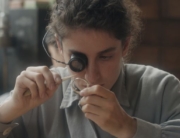The standard “That’s Amore” is heard in both instrumental and lyrical versions throughout Love Is All You Need. It’s seemingly a nod to the quirky romantic comedy Moonstruck, another movie about a middle-aged woman finding passionate love, though with someone closer to her age this time around. While Moonstruck feels like a more personal look at the wonder of love, Love Is All You Need uses a wider lens. The film itself is international, written and directed by the Danish Oscar winner Susanne Bier, starring British actor Pierce Brosnan, and taking place mostly in southern Italy. Because of its expansiveness, especially concerning the many characters, it loses the surprising charm of a smaller film like Moonstruck. That said, Love Is All You Need is filled with enough spark to make it an enjoyable contemporary variation of a theme.
Ida (Trine Dyrholm, recently seen in last year’s A Royal Affair) has just finished treatment for breast cancer. She is ready for a break from hospitals and is excited to be taking a trip to Italy where her daughter, Astrid (Molly Blixt Egelind), is getting married. She is thus shocked when she comes to home during the day to find her husband (Kim Bodnia) having an affair with his co-worker. She decides to fly from Copenhagen to Italy on her own and deal with the situation later.
While parking at the airport, she accidentally crashes into another car. Serendipitously, the vehicle belongs to Philip (Pierce Brosnan), the father of Patrick (Sebastian Jessen), the boy about to marry her daughter. Philip is in the business of selling fruit and vegetables and owns the lemon grove in Italy where the wedding is set to take place. After the death of his wife many years ago, Philip has thrown himself into work and neglected everyone in his life, including his son. Sweet and sensitive, Ida is quick to call Philip out on his brashness, and the two begin an unlikely friendship that slowly turns romantic.
Love Is All You Need follows the tropes of most romantic comedies: misunderstandings and awkward situations abound, all taking place at the celebration of Astrid and Patrick’s impending wedding. Astrid is worried that her fiancé isn’t attracted to her, her father shows up with his new girlfriend, Philip’s sister-in-law is under the misconception that she and Philip have some kind of attraction for each other, and the list goes on. While the plot doesn’t flounder much at any point, the film would have benefited from the sole focus on the relationship between Philip and Ida. In all the subplots, their conclusions felt rushed or overlooked. Philip and Ida, though, reach a clear resolution.
The bright colors and gorgeous scenery make it difficult not to be swept away by the romance of it all. Unlike Bier’s earlier films, including another concerning marriage, After the Wedding, the film feels lighthearted and optimistic, even with a serious plot point about a woman dealing with cancer. The internationality of it makes it appear like a Love Actually without the Christmas backdrop. It’s not necessarily anything new, but for a typical rom-com, it’s probably as atypical as you can get.






Leave A Comment